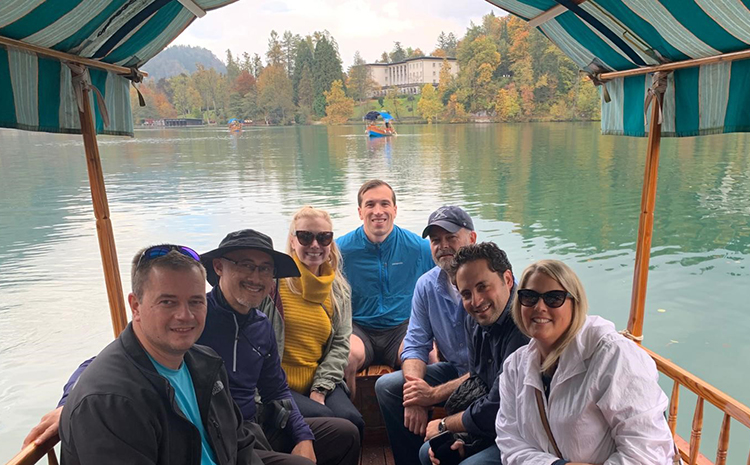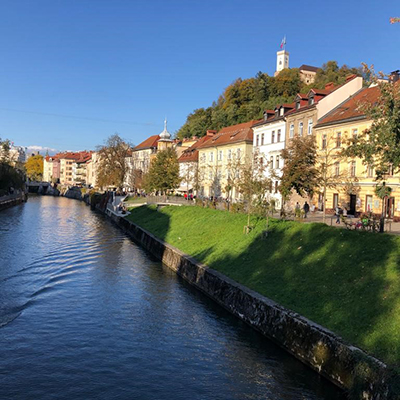
EMBA INTERNATIONAL COURSE TEACHES STUDENTS ABOUT BUSINESS AND THEMSELVES
Nov 20, 2019
Rubi Ho had spent more than 30,000 hours as a business management consultant before deciding to pair that with a degree from the Xavier Executive MBA program. Along the way, he and his peers in the Class of 2019 added to their business education by traveling to Munich Germany, Ljubljana, Slovenia, and Salzburg.
“I consider the international business and culture immersion course as one of the key highlights of the entire program,” Ho said. As CEO and President of Rubi Ho Group, he says there are three reasons why the course adds so much to the program:
- Exposure to the portfolio of businesses across Europe was invaluable from a comparative and learning standpoint;
- Exposure to different cultures and cultural norms opens eyes, expands horizons and mindsets;
- Exposure to No. 1 and No. 2 helps leaders make better decisions, because 'global awareness' and norms are taken into consideration.
“This is invaluable, regardless of whether or not the firms are local or regional,” Ho said.
One of the hallmarks of the Executive MBA program has always been an International Residency, which is included in the cost of tuition. 
The students research each locale beforehand, learning about everything from its political history to cultural landmarks. Through reflection — a uniquely Jesuit-inspired value — students share their insights and discoveries with each other.
“The entire EMBA experience has been filled with friendship, camaraderie, sacrifice, challenge, reward, pride, personal growth, and self-actualization,” said Kim Saylor, vice president of business development at Concept Rehab, Inc. “I have created friendships and bonds with peers, professors and University personnel.”
Like Thomas Lebesmuehlbacher, assistant professor in the Department of Economics, Williams College of Business.
“For students, this course certainly adds to the cultural experience, but also to their business experience,” he said. “Being exposed to a different culture for a while and learning about it is helpful for students working in a global market place and with international teams. It builds tolerance, provides them with different perspectives, and shows them that there are many ways to accomplish a task.”
He says he especially hopes the students get a sense of team building and tolerance.
“All of our students come from diverse backgrounds,” he said. “We have people that have never been to Europe, and people that go there monthly for business. We have people that are picky eaters, and people that are willing to experience different types of food. When you are in such a diverse group, simple tasks like picking a restaurant can be challenging. Our students also come from different religious backgrounds. For example, one of our students is Jewish. When we visited the concentration camp in Dachau, it obviously hit close to home for him. His wife's grandparents were held at that camp. The former grounds of the camp now include religious sites were people can pray and commemorate, so he wanted to take some time and pray there. The other students were very supportive of his wishes and had no problem spending extra time at the museum so he could show his respects.”
Another student had a family friend who lived in a house in Salzburg during the war. The student wanted to surprise the friend by taking a contemporary picture of the house today.
“Again, the other students were very accommodating to his wish to look for the house and even helped him find it,” Lebesmuehlbacher said. “Both Germany and Slovenia having an interesting history, Fascism vs Communism, so society is very different there relative to the U.S. In our daily reflection sessions we talk about these things, how they work differently in the U.S., and what the effects are on society overall. By the end, students actually engaged in these types of discussion among their own. They became very aware of cultural difference and got excited discussing them among themselves.”
 Saylor agreed that there was a lot to learn from her classmates.
Saylor agreed that there was a lot to learn from her classmates.
“The EMBA is an amazing process of transformation and refinement,” she said. “The program requires hard work, time management and perseverance, but the personal and professional growth is remarkable. I searched throughout the region for a program that builds upon my Executive tenure, offers the highest caliber professors and a compressed schedule that accommodates my demanding schedule. Xavier is the superior option.
“The capstone, international course, and the overall EMBA program exceeded my expectations,” she continued. “I will forever carry my new skills, knowledge, Jesuit principles and friendships with me as I advance my career forward.”
— Ryan Clark, Sr. Digital Content Strategist, Xavier